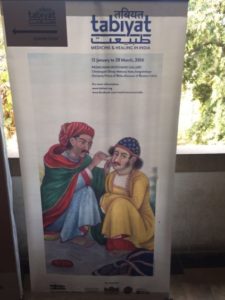7th April 2016 Mumbai, India
Design for infection control and prevention
Dr Teresa Inkster, Lead Infection Control Doctor with the Queen Elizabeth University Hospital, Glasgow, UK recently visited Mumbai to explore UK-India collaborations in design for infection control and prevention. Through this guest blog, Dr Inkster shares her experience, thoughts, and possibilities.
 In March 2016, I travelled to Mumbai, India with two Infection Control colleagues from the UK to participate in the UK India workshop on Design for Infection Control and Prevention.
In March 2016, I travelled to Mumbai, India with two Infection Control colleagues from the UK to participate in the UK India workshop on Design for Infection Control and Prevention.
This was my first visit to India and despite the missed flight connection and ensuing jet lag I was keen to get out and explore the hustle and bustle of the city.
Exhilarating rickshaw and train rides took us to South Mumbai where we visited the main attractions of the area. As we walked, we were frequently reminded of fairly recent struggles India has faced in relation to the control of infectious disease. Earlier in 2016, India maintained its polio free status for five consecutive years – an achievement to be proud of and one cited by Bill Gates as the world’s greatest health achievement.
The following morning we met Pradeep Pillai from the British Deputy High Commission Mumbai who had arranged for us to meet with Infection Control colleagues at three of Mumbai’s hospitals. We had some time first however to visit the Wellcome collection exhibition; Tabiyat – Medicine and Healing in India, held at Chhatrapati Shivaji Maharaj Vastu Sangrahalaya. Tabiyat is the Indian word for both physical and psychological health and the exhibit portrayed examples of various such healers. My personal favourites were the bone setter and roadside ear cleaners.
 Throughout the rest of the day we visited three Mumbai hospitals – Asian Heart Institute, P. D. Hinduja National Hospital and Tata Memorial Hospital. We toured outpatient clinics, intensive care units, operating theatres, a sterilisation and disinfection department and a microbiology lab. We met with motivated and dedicated Infection Control doctors at each hospital. They told us about the infection control challenges they faced. It was very informative for us to hear about MDR/XDR tuberculosis and multi/pan drug resistant Gram negative organisms both of which remain rare in the UK. Whilst visiting the hospital wards/departments, we discussed control measures important in the prevention of antimicrobial resistance and transmission of micro-organisms; cleaning of the environment and equipment, hand hygiene, antimicrobial stewardship, surveillance, diagnostics and ventilation in particular.
Throughout the rest of the day we visited three Mumbai hospitals – Asian Heart Institute, P. D. Hinduja National Hospital and Tata Memorial Hospital. We toured outpatient clinics, intensive care units, operating theatres, a sterilisation and disinfection department and a microbiology lab. We met with motivated and dedicated Infection Control doctors at each hospital. They told us about the infection control challenges they faced. It was very informative for us to hear about MDR/XDR tuberculosis and multi/pan drug resistant Gram negative organisms both of which remain rare in the UK. Whilst visiting the hospital wards/departments, we discussed control measures important in the prevention of antimicrobial resistance and transmission of micro-organisms; cleaning of the environment and equipment, hand hygiene, antimicrobial stewardship, surveillance, diagnostics and ventilation in particular.
On Tuesday, 15th March, we participated in the workshop hosted by P. D. Hinduja Hospital and the UK Science and Innovation Network. Speakers from both the UK and India participated. Peter Hoffman, a UK expert on ventilation set the scene with his talk on ventilation standards, operating theatres and isolation rooms. I followed with a talk on water damage in hospitals highlighting the importance of shared learning in infection control. My colleague Dr Christine Peters’ talk entitled ‘Baffles, Sinks and Overheating’ continued on the shared learning theme with examples of problems encountered within the environment of an intensive care unit. Lots of discussion and debate took place between delegates at the workshop with regards to hospital ventilation issues and options for water control in hospitals.
 The workshop and hospital visits are the start of an exciting collaboration between India and the UK in relation to design for infection prevention and control and the role it plays in the battle against antimicrobial resistance. Delegates have been surveyed for ideas and priorities for future collaboration and research. Funding is available from a number of sources and opportunities exist for international exchange programmes and fellowships.
The workshop and hospital visits are the start of an exciting collaboration between India and the UK in relation to design for infection prevention and control and the role it plays in the battle against antimicrobial resistance. Delegates have been surveyed for ideas and priorities for future collaboration and research. Funding is available from a number of sources and opportunities exist for international exchange programmes and fellowships.
Special thanks to Pradeep Pillai, British Deputy High Commission, Mumbai.